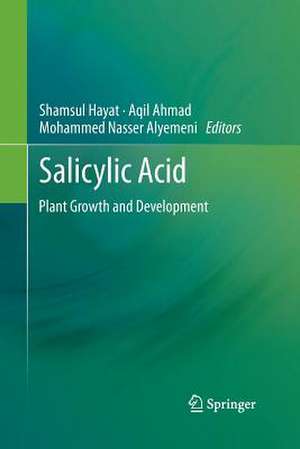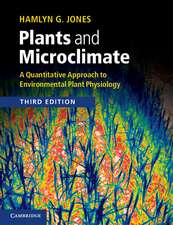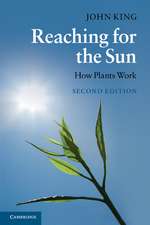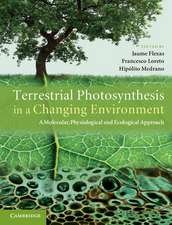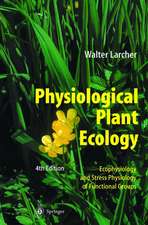SALICYLIC ACID: Plant Growth and Development
Editat de Shamsul Hayat, Aqil Ahmad, Mohammed Nasser Alyemenien Limba Engleză Paperback – 21 mai 2015
| Toate formatele și edițiile | Preț | Express |
|---|---|---|
| Paperback (1) | 944.34 lei 6-8 săpt. | |
| SPRINGER NETHERLANDS – 21 mai 2015 | 944.34 lei 6-8 săpt. | |
| Hardback (1) | 961.55 lei 6-8 săpt. | |
| SPRINGER NETHERLANDS – 30 apr 2013 | 961.55 lei 6-8 săpt. |
Preț: 944.34 lei
Preț vechi: 1151.63 lei
-18% Nou
Puncte Express: 1417
Preț estimativ în valută:
180.76€ • 196.41$ • 151.93£
180.76€ • 196.41$ • 151.93£
Carte tipărită la comandă
Livrare economică 21 aprilie-05 mai
Preluare comenzi: 021 569.72.76
Specificații
ISBN-13: 9789400797062
ISBN-10: 9400797060
Pagini: 408
Ilustrații: XVI, 389 p.
Dimensiuni: 155 x 235 x 21 mm
Greutate: 0.57 kg
Ediția:2013
Editura: SPRINGER NETHERLANDS
Colecția Springer
Locul publicării:Dordrecht, Netherlands
ISBN-10: 9400797060
Pagini: 408
Ilustrații: XVI, 389 p.
Dimensiuni: 155 x 235 x 21 mm
Greutate: 0.57 kg
Ediția:2013
Editura: SPRINGER NETHERLANDS
Colecția Springer
Locul publicării:Dordrecht, Netherlands
Cuprins
Preface.- Contributors.- About the editors.- 1. Salicylic acid: An update on biosynthesis and action in plant response to water deficit and performance under drought.- 2. Salicylic acid: Physiological roles in plants.- 3. Salicylic acid and phospholipid signaling.- 4. Transport of salicylic acid and related compounds.- 5. Interplay between environmental signals and endogenous salicylic acid concentration.- 6.Impact of salicylic acid on the transport and distribution of sugars in plants.- 7. Endogenous ABA as a hormonal intermediate in the salicylic acid induced protection of wheat plants against toxic ions.- 8. Salicylic acid biosynthesis and role in modulating terpenoid and flavonoid metabolism in plant responses to abiotic stress.- 9. Salicylic acid-mediated stress-induced flowering.- 10. Salicylic acid-mediated abiotic stress tolerance.- 11. Signaling role of salicylic acid in abiotic stress responses in plants.- 12. The interplay between salicylic and jasmonic acid during phytopathogenesis.- 13. Potential benefits of salicylic acid in food production.- 14. Short and long term effects of salicylic acido n protection to phytoplasma associated stress in potato plants.- 15. Efficiency of salicylic acid application on postharvest perishable crops.- 16. Recent advances and future prospects on practical use of salicylic acid.
Notă biografică
Dr. Shamsul Hayat is an Associate Professor, in the Department of Botany, Aligarh Muslim University, Aligarh, India and presently working as Associate Professor in the Department of Botany & Microbiology, King Saud University, Riyadh, Saudia Arabia. He received his Ph.D. degree in Botany from Aligarh Muslim University, Aligarh, India. Before joining the Department as faculty, he has worked as Research Associate and Young Scientist in the same Department. His major areas of research are phytohormones and heavy metal stress in plants Dr. Hayat has been awarded Prof. HiraLalChakravorty Award by Indian Science Congress Association, Kolkata, India, Associate of National Academy of Agricultural Sciences, New Delhi, India, BOYSCAST fellow by Department of Science & Technology, Government of India, New Delhi and young scientist by Association of the Advancement of Science, Aligarh, India. He has been the Principal Investigator of the various projects sanctioned by different agencies and guided three students for the award of Ph.D. degree and two students for the award of M.Phil degree. Dr. Hayat has published more than hundred research papers in leading journal of the world such as Environmental & Experimental Botany, Plant Physiology & Biochemistry, Environmental Pollution, PlantSignalling&Behaviourand also published nine books published by Kluwer Academic, Springer, Wiley-VCH, Science Publisher and Narosa Publishing House. His works has been cited in various journals and at present about 1500 citation has been noted.
Dr. Aqil Ahmad is the senior most Professor, in the Department of Botany, Aligarh Muslim University, Aligarh, India. He was conferred Ph.D. by Aligarh Muslim University, Aligarh in 1975. Dr. Ahmad worked as Post-Doctorate Research Fellow of Danish International Development Agency (DANIDA) in Plant Physiology at Royal Vet. & Agric. University, Denmark. He has also worked at Department of Applied Sciences, Higher College of Technology, Muscat, Sultanate of Oman. He has been the Principal Investigator of various projects sanctioned by different Government agencies and guided six students for the award of Ph.D. degree. His current research area includes phytohormones and heavy metal stress. Dr. Ahmad has published more than hundred research papers and has edited a number of books, published by various leading publishers of India and Europe. His work has been cited in various leading journals.
Dr. Mohammed Nasser Alyemeni is a Professor in the Department of Botany & Microbiology, King Saud University, Riyadh, Saudia Arabia. He has completed his M.Phil from Reading University U.K. and Ph.D. from Edinburgh University, U.K 1989. He has been the principal investigator of the various projects and guided four students for the award of Ph.D. degree. Dr. Alyemeni has published more than fifty research papers and also authored four books in the area of plant ecology in arabic language. His current area of research is eco-physiology. He was the regional editor of Pakistan Journal of Biological Sciences. He has attended various national and International conferences in various countries.
Dr. Aqil Ahmad is the senior most Professor, in the Department of Botany, Aligarh Muslim University, Aligarh, India. He was conferred Ph.D. by Aligarh Muslim University, Aligarh in 1975. Dr. Ahmad worked as Post-Doctorate Research Fellow of Danish International Development Agency (DANIDA) in Plant Physiology at Royal Vet. & Agric. University, Denmark. He has also worked at Department of Applied Sciences, Higher College of Technology, Muscat, Sultanate of Oman. He has been the Principal Investigator of various projects sanctioned by different Government agencies and guided six students for the award of Ph.D. degree. His current research area includes phytohormones and heavy metal stress. Dr. Ahmad has published more than hundred research papers and has edited a number of books, published by various leading publishers of India and Europe. His work has been cited in various leading journals.
Dr. Mohammed Nasser Alyemeni is a Professor in the Department of Botany & Microbiology, King Saud University, Riyadh, Saudia Arabia. He has completed his M.Phil from Reading University U.K. and Ph.D. from Edinburgh University, U.K 1989. He has been the principal investigator of the various projects and guided four students for the award of Ph.D. degree. Dr. Alyemeni has published more than fifty research papers and also authored four books in the area of plant ecology in arabic language. His current area of research is eco-physiology. He was the regional editor of Pakistan Journal of Biological Sciences. He has attended various national and International conferences in various countries.
Textul de pe ultima copertă
Phytohormones are known to direct plant growth, in a coordinated fashion in association with the metabolism that supplies energy and the building blocks to generate the form that is recognized as a plant. Out of the chemicals recognized as hormones, attention has largely been focused on Auxins, Gibberellins, Cytokinins, Abscisic acid, Ethylene and more recently to Brassinosteroids. However, this book provides the recent information about a natural chemical, Salicylic Acid, that could be raised to the status as assigned to the above phytohormones because it has significant regulatory impact on important aspects of the plant life. Salicylic acid (SA) was first discovered as a major component in the bark extracts from Salix (willow) which was used as an anti-inflammatory drug. However, SA is ubiquitous in plants, generating a significant impact on plant growth and development, photosynthesis, transpiration, ion uptake and their transport. Moreover, SA also induces specific changes in leaf anatomy and chloroplast structure. SA is recognized as an endogenous signal, mediating in plant defence, against pathogens. In this book a total of 16 chapters have been included which provide a recent update on salicylic acid. This book is not an encyclopedia of reviews but includes a selected collection of newly written, integrated, illustrated reviews describing our knowledge on salicylic acid. The aim of this book is to tell about the salicylic acid involvement in plants, by the present time. The various chapters incorporate both theoretical and practical aspects which may serve as a baseline information for future research through which significant developments are possible. We are of the opinion that this book will be of immense importance to all those who have even the least interest in biological and agricultural sciences.
Caracteristici
Contributions from experts in their field Use of Salicylic Acid in food production
